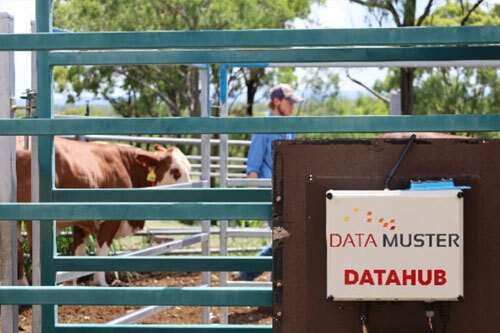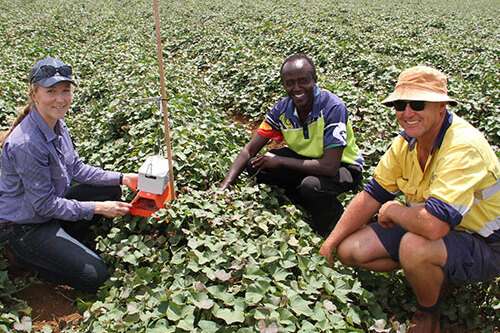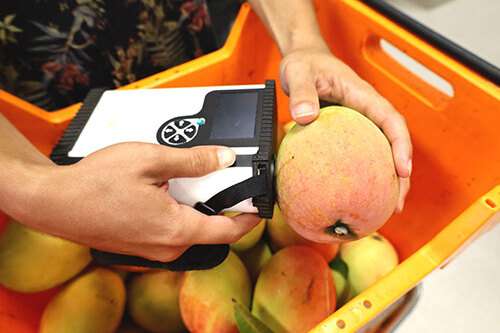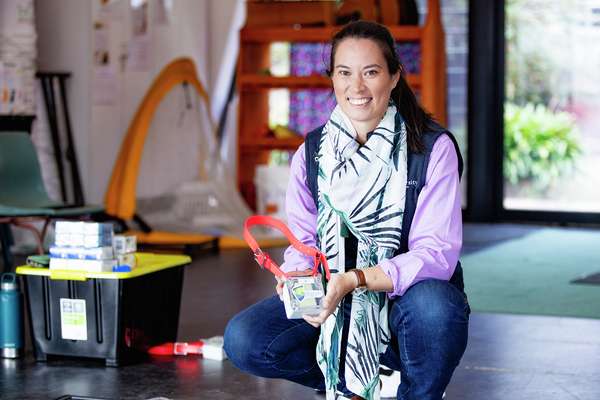Institute for Future Farming Systems
In particular, it is internationally recognised for its specialist skills in the development of non-invasive, precision management tools, with its research in this area independently assessed as above world class (ERA ratings of 4 and 5 in the last two assessments).
Northern Australia’s Agricultural Innovator
Our flagship Institute for Future Farming Systems (IFFS) is delivering new agricultural innovations and providing an environment for practical, skills-based training and research-led teaching.
Delivering research which is grounded in industry needs – the Institute’s researchers live and work in the communities they serve, with staff working closely with industry partners and primary producers in Bundaberg (Australia’s largest vegetable producing region), Emerald (a major broadacre farming area), and Rockhampton (Australia’s beef capital).
Transcript
CQUniversity is a world leader in agriculture science research specialising in non-invasive and precision agriculture technologies. The university's agriculture research delivers solutions that are bolstering the productivity of the livestock and horticultural sectors. CQUniversity's Institute for Future Farming Systems is made up of a team of researchers, research higher degree students and support staff with expertise in the major agriculture science discipline field and a commitment to quality research that has an impact for industry. The Institute for Future Farming Systems' team works closely with industry partners with a particular emphasis on industries based in the subtropical and tropical regions of northern Australia.
"Drip line is ideally suited to optimising the fertigation so it makes sense for us to work with this. Netafim are very keen for this trial to succeed and we're delighted to be involved with our collaborative partners. So those systems are being tested here with the hope of growing more crop for farmers in a more profitable way." Research activities are focused in three broad themes including precision livestock management, precision horticulture and non-invasive sensor systems.
"We're really looking at digital technologies and how we can apply those to industry problems and I guess gather new information to help us better understand but also to better manage cattle in the cattle industry in northern Australia. So I guess the biggest problem that we're really focused on is fertility. Fertility is a major driver of profitability but it's one of those really challenging areas to I guess measure and monitor the performance of cattle. So we're looking at automated ways of recording the fertility performance of cattle in remote locations. There's sort of a big drive at the moment around walk over weighing so this is where you have a weigh platform in a remote location; when cattle come onto water they walk across that platform, we use the electronic identification system in their ears, we know their identification, we know their weight and we're actually able to start telling you something about their performance.”
The team is also using technology to improve the understanding of animal behaviours, all with the view to improving on-farm profitability and productivity. "The problem within the seed stock industry is that it's difficult within extensive areas of Northern Australia to capture information such as maternal parentage and calving date. Calving date, in particular, is a key parameter in determining how effective a cow is at having a calf every year or every couple of years, so her calving interval is captured between two calving dates and that is a big decider in whether she's going to throw bull calves that will then go out into the herd and be very productive as well. In terms of calf loss, the calf alert device, as I say is about determining the date and location of calving, so if researchers can get a better idea of what's happening in the first 48 hours, whether it's something to do with predation, poor mothering, distance to water, calf ill thrift or a congenital defect. So really it's a research tool to try and determine what's happening in that first 48 hours, that perinatal period. Well certainly if you're looking at the calf loss situation the typical scenario is that from confirmed pregnancy to weaning in Northern Australia we'll lose somewhere around 10 to 15% of calves and it's thought about 5% of those are lost in the perinatal period, so it's a big determinant of profitability and if we can determine more closely what's happening within that period, perhaps put in some managerial changes, they'll have a big effect on the northern beef industry."
"Most people now realise one of the most productive traits in northern Australia is fertility and we're seeing the data that we're collecting with CQUni and their walk-over-weighing really helps us collate very intensive measurements that give us an indication of the quickest re-breeders and more fertile cattle in the herd and any technology that can help get those accurate measurements to then validate and collate with the genomic information will be incredibly important."
CQUni's precision horticulture team works in partnership with the Queensland Department of Agriculture and Fisheries and is focused on improving the productivity and profitability of the state's major horticultural commodities by developing innovative future farming practices. "I work very closely with horticultural industries to try to find ways to improve their productivity and profitability. Internationally I'm looking at two projects that are trying to generate income opportunities for poor farmers in the Pacific and in the highlands of Papua New Guinea through some horticultural crop innovations. Within Australia, we work on a range of different problems from trying to control some pests and diseases in, for example, sweet potato crops to new technologies that might reduce input costs and improved productivity. Success in our research for industry would mean farmers being able to make more money from their activities, to improve the productivity of their cropping systems, and to do so in a sustainable way so that they and their children and their children's children will still be able to do the same production systems."
The non-invasive sensors research team is focused on the development of new hardware that can assess agricultural commodities and advance productivity without damaging the food products. "So we've had a range of postgraduates and postdocs involved from both the agronomic point of view, the electrical engineering point of view, the IT software side that melds together to make an operational unit to deliver a holistic product. Initially, we were prompted by growers to look at estimating the quality of fruit non-invasively, its internal quality being sugar content or dry matter content, and that took us down the path of measuring in-line so you're on a pack line, you're sorting on colour and weight. Now we are adding another facility that is estimating that the sugar content or dry matter content of that fruit. As you know as a consumer yourself you go into a retail store and you purchase fruit on the basis of what it looks like, take it home and you have an eating experience that's bad and the research says that you won't go back to buy that fruit for four to six weeks. So it's not an instant decision, but it's certainly important to repeat purchase. We were in the fields doing the dry matter measurements and we could see the grower practice of trying to estimate fruit yields, that is, how much crop was on the tree, so that they could be organised in terms of labour requirements, packhouse requirements and that was all being done manually with a hand counter. So that led us into a new line of work looking at machine vision in the field, so rather than just machine vision in the packhouse taking it into the field to estimate crop load across the field. The next step on from that of course, having seen the fruit, is to try to reach out to pick the fruit to automate the harvest."
The Institute for Future Farming Systems welcome opportunities to collaborate with researchers and research institutions who share their interests in agricultural research. CQUniversity has world-class laboratory and field facilities providing a welcoming and supportive environment for postgraduate students and visiting researchers. The horticulture team is already making a difference to industry delivering major products improving the chilli, tomato and sweet potato industries.
"Yeah, the focus of our research is focused on the important key crop disease in our region like currently, we have a project to work on root-knot nematode management in sweet potato. The problem I try to solve is to help the growers to reduce nematode populations and of course, reduce the damage to yield so they could maintain the productivity and income. As a scientist, we do encourage the growers to adopt more sustainable management strategies on the farm because it's good to maintain productivity, not in only a few years short term, but also in the long term.”
CQUniversity is proud to partner with government and industry stakeholders in the agriculture sector. To find out more about getting involved in our research, contact the University.
Learn More
The Institute for Future Farming Systems specialises in six targeted fields of research where we have world-class capabilities that can deliver maximum benefit for rural industries. They are:
- Precision Horticulture
- Precision Livestock Management
- Non Invasive Sensor Technologies
- High-value Tropical Cropping
- Poultry Microbiome
- Agri-tech Education and Extension
The Institute for Future Farming Systems aspires to use its Central Queensland base and the collective skills of its staff to become the major contributor to successful agricultural industry development in northern Australia.
The Institute’s team is made up of researchers, higher degree students and professional staff, all with expertise in the major agricultural science discipline fields and a commitment to delivering impact for industry.
Professor Amy Cosby
IFFS Interim Director and Agri-tech Education and Extension Cluster Leader
Associate Professor Amy Cosby brings a broad range of knowledge and real-world skills to her leadership of the Agri-tech Education and Extension, with a Bachelor of Agriculture/Bachelor of Laws (Hons 1) and a PhD in Precision Agriculture to go with her family life on a Gippsland dairy. Amy is a leading practitioner and researcher in the field of student and teacher engagement within the agricultural industry and has extensive experience in leading large-scale projects. Amy works with educators, researchers and industry professionals to develop innovative programs to increase the skills and knowledge of teachers and students in agricultural concepts, tools and systems. Amy has conducted numerous surveys with both educators and students to evaluate their current level of agricultural knowledge and perception of the industry from a range of rural and urban locations. Her objective is to use the knowledge derived from this research to design programs which showcase and attract the next-generation agricultural workforce to the industry from diverse backgrounds. She has developed and implemented a range of curriculum-aligned agri-tech learning modules for university, VET and high school students. These modules aim to showcase the scientific and digital skills required in the agricultural industry to attract and build the capacity of the next-generation workforce. This research aims to demonstrate that by exposing young people to agri-tech from an early age this will increase the adoption on technology across the agricultural supply chain as when these young people enter the workforce as they will be confident and skilled in the use of agri-tech.
Professor Philip Brown
Precision Horticulture Cluster Leader
Professor Philip Brown is an agricultural scientist with a passion for working with agricultural industries to improve their productivity, profitability and sustainability. Phil arrived in Bundaberg in 2010 to take up the position of Professor of Horticultural Science. The position is jointly funded by CQU and the Queensland Government Department of Agriculture, Fisheries and Forestry. Prior to this appointment, Phil was the Head of the School of Agricultural Science at the University of Tasmania and had worked for 15 years in research and teaching roles at the university. Phil's research expertise is in horticultural science, with a focus on plant physiology and agronomy. He works closely with industry partners to deliver practical outcomes based on an understanding of the physiological and anatomical basis of crop development. Bundaberg is the perfect location for horticultural research, with a greater concentration of horticultural industries in the region than anywhere else in Australia.
Professor Mark Trotter
Precision Livestock Management Cluster Leader
Professor Mark Trotter is a leading researcher in the field of precision livestock management. With hands-on experience in the dairy and beef industries, and a background in agribusiness he brings a practical business emphasis to livestock research. His focus is on developing sensors and management systems that improve the production, efficiency, and sustainability of grazing livestock systems. Mark leads the Precision Livestock Management research cluster at CQUniversity. He is a Fulbright Scholarship recipient and holds adjunct appointments at The Ohio State University and Oklahoma State University.
Professor Kerry Walsh
Non-Invasive Sensor Technology Cluster Leader
The theme of Professor Kerry Walsh's career has been the application of non-invasive instrumentation to issues related to plant performance, and in particular, in photosynthate transport - assimilate partitioning. He has led multidisciplinary work resulting in the association of a phytoplasma with the papaya dieback disorder, and the use of near infra-spectroscopy (NIRS) for fruit quality assessment. Kerry has a practical, hands-on, capability, yet an academic perspective on life. He strongly believes that his R&D effort should result in a gain to society and that he should provide practically relevant training to undergraduates and postgraduates.
Professor Dana Stanley
Poultry Microbiome
Professor Dana Stanley is one of Australia’s highest contributors to the field of poultry intestinal microbiota. Using sequencing technology and 16S rRNA gene to study microbial diversity is a relatively new approach that requires substantial knowledge of microbiology, molecular biology and bioinformatics. Professor Stanley’s research on intestinal microbiota in health and disease focuses on the role of microbiota in poultry and other agricultural animals, as well as rodent models of human disease Additionally, Professor Stanley is a dedicated researcher is the area of poultry gut health and is one of the most published researchers at an international level, in the area of poultry gut health and the role of optimal intestinal bacterial community in bird performance. Dana Stanley’s intestinal microbiota agricultural and veterinary research is complemented with human health studies. She established a reputation as a researcher in intestinal microbiota through long-term investigations in human health that resulted in high-impact publications.
Being based in Australia’s richest and most diverse agricultural region, our greatest research facility is the access to the industries on our doorstep. No-where else in Australia do researchers have such ready access to the range and size of industry partners as CQU has in its footprint region. The Institute for Future Farming Systems is also well-equipped with equipment and facilities to support its agricultural researchers. The state-of-the-art Central Queensland Innovation and Research Precinct (CQIRP) houses dedicated laboratory spaces, animal handling facilities, glasshouse facilities, dedicated crop research areas and analytical equipment to support our staff. Partnerships with AgForce and the Queensland Department of Agriculture and Fisheries also give our researchers access to research farms in Rockhampton and Bundaberg.
We are a multidisciplinary team of researchers with active research collaborations with researchers in Australia and around the world. We work in partnership with Government and industry organisations, including key partners:
- Agforce Queensland
- Queensland Department of Agriculture and Fisheries
- Bundaberg Fruit & Vegetable Growers
- Meat & Livestock Australia
- Australian Mangoes
- Horticulture Innovation Australia
- AustChilli
- Australian Centre for International Agricultural Research (ACIAR)
- Teys Australia
- Rabobank
- The Ohio State University
- Argentina's National Institute of Agricultural Technology (INTA)
- CRC for Developing Northern Australia
- AgriVentis Technologies
- Peanut Company of Australia
- North Australia Beef Research Council
Precision Livestock Management (PLM)
CQUniversity’s Precision Livestock Management (PLM) team is recognised as the national leader in the field of tropical livestock research.

Precision Horticulture
CQUniversity’s Precision Horticulture team is focussed on improving the productivity and profitability of Queensland’s major horticultural commodities.

Non-Invasive Sensor Technology
CQUniversity’s Non-Invasive Sensor team has led the world in the use of near infrared spectroscopy for assessing horticultural produce.

Contact Details
Institute for Future Farming Systems
Central Queensland Innovation Research Precinct (CQIRP)
Building 361, CQUniversity, 630 Ibis Avenue, North Rockhampton QLD 4701
Professor Amy Cosby, Interim Director
Phone: 0405 824 112
Email: a.cosby@cqu.edu.au
Centre and Institute Research Administration (CIRA) Team
Email: research-cira@cqu.edu.au

